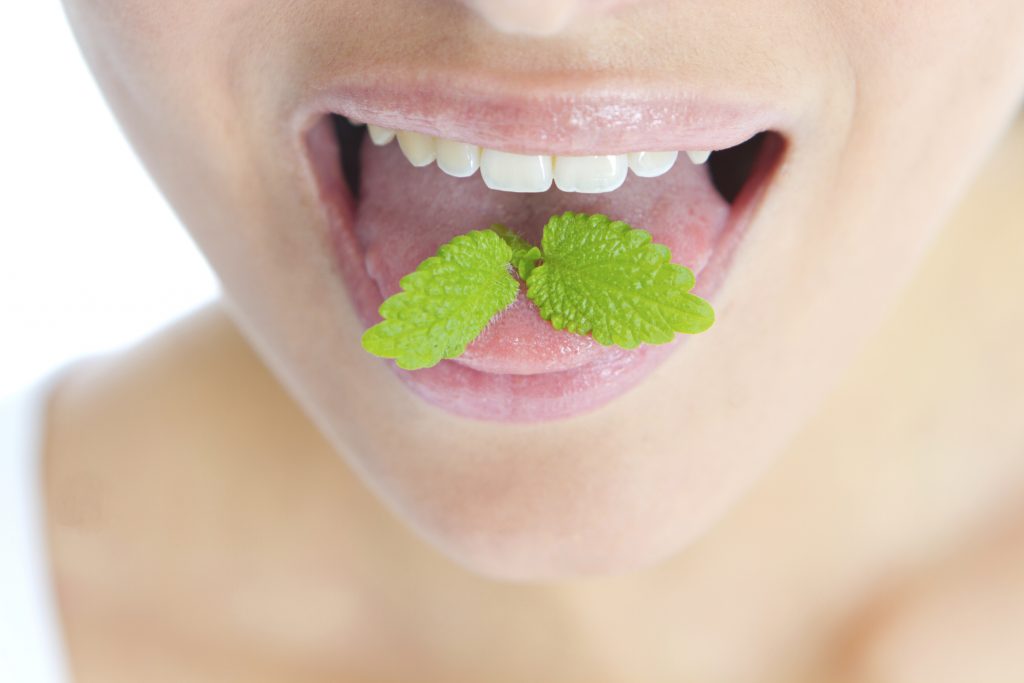
Imagine it’s still winter … you’re standing at the door, ready to brave the cold. You’re layered-up with three shirts and a sweatshirt, your heavy winter coat, and two layers of socks underneath your waterproof winter boots. Then you’ve got those awesome jeans with the flannel on the inside, your comfy hat, scarf, and gloves. You’re set! But wait. As you step toward the door, you suddenly realize you have an itch … and it’s deep down … buried beneath all those layers. And try as you may, every attempt to reach that bugger-of-an-itch fails. Defeated, you realize the only relief you’re ever gonna’ get is to remove each one of those layers. Where are we going with this?!
We’re going inside your mouth, of course, to your tongue – this is a dental article, after all! Because whether you know it or not, like you in the wintertime, your tongue is also “all covered up” – buried beneath layers of bacteria, fungi, and food residue that can inhibit your ability to taste, let alone cause your tongue to appear various shades of yellow, white, or green! Remove the bacteria, though, and your food will once again directly interact with those taste buds and return to its natural hue. So how does one do that? With a tongue scraper, of course!
WHAT is a tongue scraper?
A tongue scraper is a U-shaped device designed to “scrape” the top layer of scum from your tongue. They have been in use since ancient times and have been made of everything from wood to whalebone. Nowadays, they are made of more hygienic material, and come in a variety of shapes, sizes, designs and colors.
WHY use a tongue scraper?
The residue on your tongue includes things like the cavity-inducing Streptococcus mutans bacterium, fungi, rotting food (that’s not good), and what’s referred to as “volatile sulfur compounds.” In other words, sulfur – that “rotting egg smell.” Talk about ew! So, as you can see, there are several reasons why you’d want to get rid of this gunk in your mouth. Let’s tackle them one by one:
- Get rid of bad breath. ‘Nuff said!
- Reduce your risk of periodontal disease and cavities. Bad bacteria contribute to plaque and tartar on teeth, making them more susceptible to cavities. Bacteria build-up can also lead to inflammation of gum tissue (gingivitis). If left untreated, gingivitis can lead to periodontal disease, which means a more expensive dental visit (plus other unwanted consequences!).
- Heart disease prevention. While the debate is still up in the air, some studies suggest there could be a correlation between gum disease and heart disease.
HOW does one use a tongue scraper?
In general, make sure to rinse your tongue scraper before and after use. Apply the tongue scraper to the back of your tongue and drag it forward. Then, rinse and repeat. Make sure to get the sides of your tongue as well, not just the center!
Make sure not to press too hard or you can cause yourself to bleed. And, if you’re wondering if you should scrape your tongue while recovering from a dental procedure, that’s a good question … ask your dentist for the best advice particular to your situation. Still not sure how this thing really works? The next time you’re in ask Dr. Ahmadi for a quick tutorial!
WHERE do I buy one?
Your first choice is, believe it or not, your dentist. They may even have a sample they could provide to you at no cost. Tongue scrapers are relatively inexpensive and can also be found at any local drugstore. It doesn’t matter the material, color, or brand – just find the one you like and get scraping!
If you would like to find out more about tongue scrapers, contact Dr. Ahmadi at 323-312-0500 to schedule a consultation or visit www.dentalimplantcare.com for additional information.
Dr. Mike Ahmadi proudly serves Bell and all surrounding areas.

